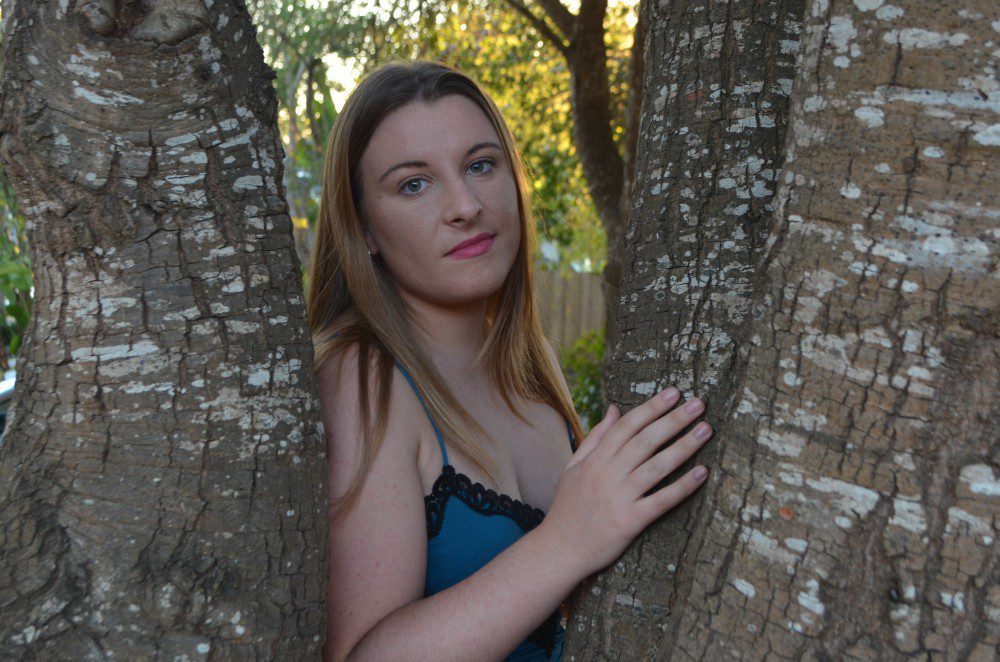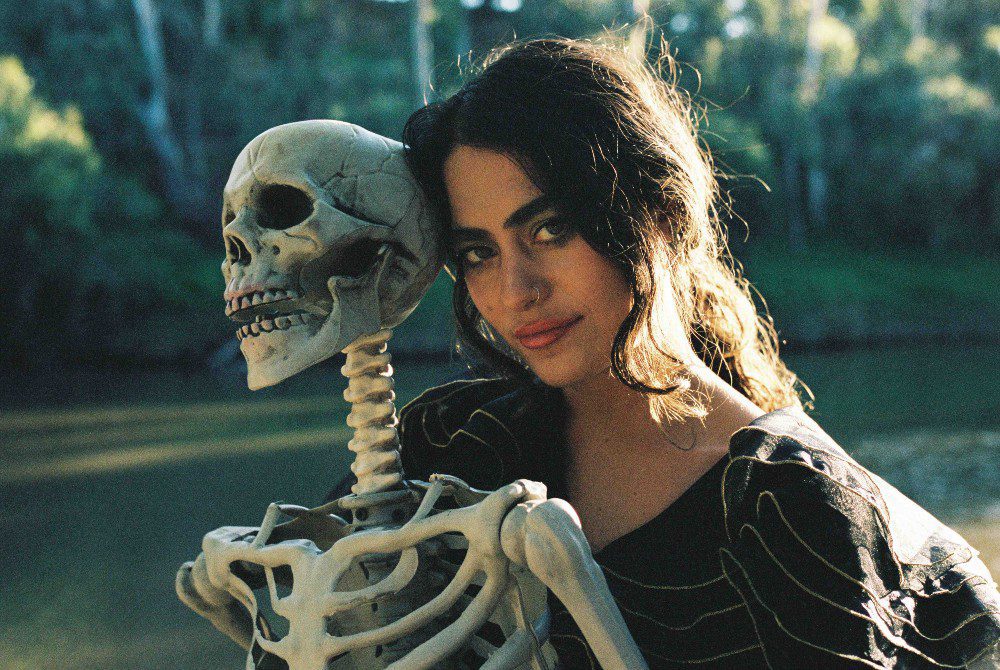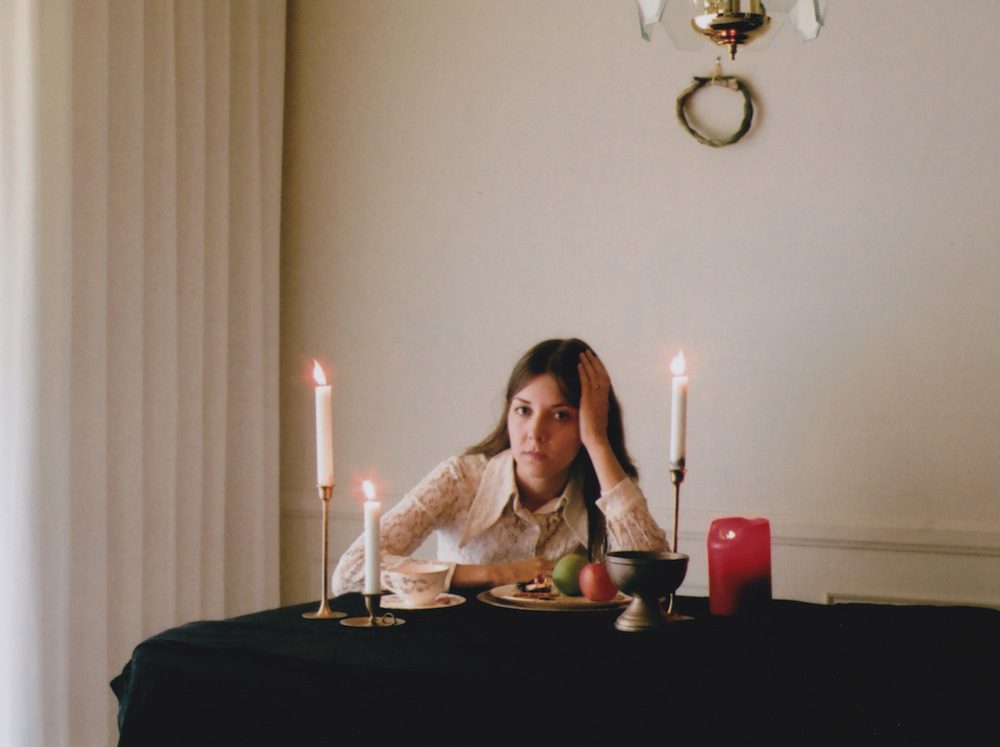Feral Reflects on TikTok Fame, Mental Health, and New Music


“Yeah, I’m the crazy ex-girlfriend still writing songs about her high school boyfriend,” says Santa Cruz’s Kelsey Ferrell, not without some exasperation. “But it’s not the only thing I am.” It’s been nearly a year since our last interview, and Ferrell—who goes by the moniker Feral when releasing music—is still trying to make this point, whether it be about her own discography, or about the microcosm we willingly enter whenever we put on an album. “All [songwriters] are writing about our past relationships and our exes and stuff,” she says. “Songs are, by nature, only a couple minutes to tell a whole story.”
That’s also the nature of TikTok, the almost ubiquitous social media app and Gen Z-favorite that has kept a significant amount of the world’s population glued to their phones in lieu of in-person entertainment. In the past year, the app has become an unexpected platform for indie artists and producers. Ferrell can now count herself among those ranks, as a recent post featuring her 2018 track “Fuck the Bourgeoisie” went viral a few days before our interview. Currently at 775k views, her sixty-second video has inspired thousands of comments that range from praise (“The fact that Spotify hasn’t recommended your song to me is honestly a crime” — from user lilveganricewrap) to scorn (“sounds like you were in it cuz he was wealthy” from user chickennnugget_) to…Marxist discourse?
“I didn’t want to delete any of the conversations [in the comments] about power or privilege or mental health or like, Marxism,” she explains. “Even if they were not very flattering to me.” Predictably, some listeners took issue with the song’s content, a tongue-in-cheek examination of a relationship with an ex-boyfriend whose incredible wealth had a huge impact on Ferrell and how she views the world. “It was stressful,” she says. “I’m not gonna lie. I only had sixty seconds to tell this story. Obviously that’s not enough time to accurately describe an entire two year relationship and all the context behind it. I did my best, but you can’t tell everyone everything in sixty seconds.” And while some people are ready and waiting to judge someone for dredging up old memories for artistic fodder, for Ferrell, the memories aren’t so dusty.
Recently, she received a PTSD diagnosis that completely reframed the way she had been moving through the world for the past four years, struggling with memories of her complicated relationship and the bullying she received from her peers in her final year of high school. “My strongest symptom is being trapped in a loop of memories that I don’t want to be reliving,” she says. “I was unable to maintain focus on school or maintain long conversations because I was just in my head.”
Just like songwriting can loosen some of the ties that bind us internally, this diagnosis gave Ferrell a name for her struggles — and, therefore, something solid to face. “It was validating and a relief to get the diagnosis,” she says, “because it was like, okay, that explains a lot. But it also was kind of scary…it’s not like there’s a blood test for it or a cure for it like other other kinds of health conditions… so it was kind of tough to be like, ‘Oh, I guess I just have to live with this.’”
If there is anything to take from Ferrell’s last four years, it’s that even if your brain and body are trapping you in the past, it doesn’t mean that your art has to be trapped, too.
In 2020, Ferrell chose to focus on creating singles, a move that enabled her to take advantage of the never-ending scramble for content that comes with the territory of being a musician in the digital age. Another step forward was working with producer Jim Greer. While she loved working with producer and friend Ian Pillsbury on her first full-length LP, 2018’s Trauma Portfolio, this time, she was ready to step out of her comfort zone and work with someone she didn’t have a personal connection to. “I was scared that I didn’t have the chops to be successful in that environment,” she says. “[But] I kind of surprised myself.”
The first result of this collaboration, “Loser,” sees Ferrell at an impasse between her old and new self. “When I was in college, I got really seduced by the idea of sex positivity,” she says. “It was like, ‘you can just go out and you can sleep with whoever you want and it’s going to be so fun, and you’re going to have a great time!’ And I felt like that was kind of a deceiving narrative because it relied on the assumption that people that you sleep with have your best interests in mind.”
“Loser” is classic Feral, biting and self-deprecating in equal turns. The chorus—“no, you don’t matter that much/you’re not the only loser that I fucked”—was inspired by a former fling who found out she wrote a song about him and started telling people she was obsessed. But, of course, this isn’t the full story. “I drew from multiple experiences and multiple people that I had had encounters with,” she says. “[The song is] about pretty much everybody I’ve ever dated or hooked up with, from my first kiss when I was twelve to the last guy I saw before quarantine started.” Their caricatures figure into the video for “Loser” (directed and produced by Rob Ulitski from Pastel Wasteland), a spoof of the VHS personal ads some lonely singles may have used long before Ferrell herself was even born.
But “Loser” isn’t just a quasi-warning to potential partners. “I do kind of look at it also as sort of harsh reminder to myself—not in like a victim blame-y way—to just stop once in a while and be like, ‘Kelsey, what are you doing? What kind of choices are you making?’” she adds.
On Valentine’s Day, she released a new version of “Native Speaker,” a folk-y pop track ready to rise from the ashes of its previous iteration on her 2020 Bandcamp release, The Quarantine Demos. A whole minute shorter and about three instruments richer, “Native Speaker” feels like Feral at her best— and it’s a standout for her, too. “I think I really transformed it from its original version into something that hits harder and can hold attention better,” she explains. “I’m just really grateful that I got to go to the studio and create that one, because that felt like a life goal for me to put that song out there.”
While the song starts out sparse, not unlike the demo, Ferrell has largely done away with the doubled audio track, letting her voice shine alone against an acoustic guitar. “We’re living in a fascist state/but I still go on dinner dates,” the track begins, setting the tone somewhere between bombast and resignation. The song seems more measured and patient then the demo version, even though there is a lot more going on musically. This is especially clear in the chorus, accompanied by drums and some sparkling percussion that adds a needed touch of whimsy. “You are the one,” Ferrell sings. “And I’m missing the tongue/of my native speaker.”
While Ferrell tells me that people who get the song just really get it, there is a tenderness to the lyrics that makes it work even beyond the realm of lost first loves. Even though the cover—a collaboration between her two close friends, illustrator Ruhee Wadhwania and photographer Annie Sampson—makes the central innuendo clear, it could just as well be about missing the experience of talking to someone who once really understood you.
Next up for release (March 26th) is “Church,” the result of an unexpected period in Ferrell’s writing, where she delved into a lot of religious metaphor. While the framework for the song is about a last-hurrah trip she took with said ex, its greater themes were formed in the fires of adulthood and all the uncertainty that comes along with it. “I always was dismissive of religion as a teenager,” she explains. “When I got older and realized how hard life is, I was like, ‘I get it. I want help.’ It reflects that moment where I started to understand why people are religious and why people need a God and why people need to pray. I had reached those moments in my life where I had become so desperate for relief or so desperate for something to go right for me that I had no other options besides calling on a higher power.”
“I had faith in you but there’s no faith in me,” Ferrell sings in the song’s opening lines. Feral has always had a no-fuss sound, but “Church” feels like a different direction from both the snarl of “Loser” and the lament of “Native Speaker,” choosing instead to take a campground-chant cadence, complete with some gentle handclaps that you might need headphones to catch. Despite the fact that it shares a subject matter with “Speaker,” something about “Church” feels more final: “It’s hurts to feel/God ain’t real/You’re still my whole entire heart/and I’ll never be a believer but I’ll miss playing the part.”
If anything, that line feels like a small relief — playing the part can only work for so long, much like living with undiagnosed mental illness. Now that Ferrell has the latter at least, she’s taking it one day at a time. And, sometimes, those days aren’t too bad. There are merch designs in the works; another song going viral on TikTok; and “Fuck the Bourgeoisie” at more than 55k streams. Not too shabby for a month and change into 2021.
Even if she’s not a believer, Ferrel does know the universe works in mysterious ways. “The week before the TikTok went viral, I sat down and wrote a song about being lost and being 22 and not really knowing what I wanted out of life and wanting to be successful but not knowing how to achieve that,” she recalls. Afterward, Ferrell began writing prolifically, partly to provide content for her newfound audience, partly because she found the success inspiring, and most importantly, because it provided some much-needed validation.
“I kind of felt this feeling of, like, hey—maybe I could do this for real,” she says. “Maybe I do have the talent.”




